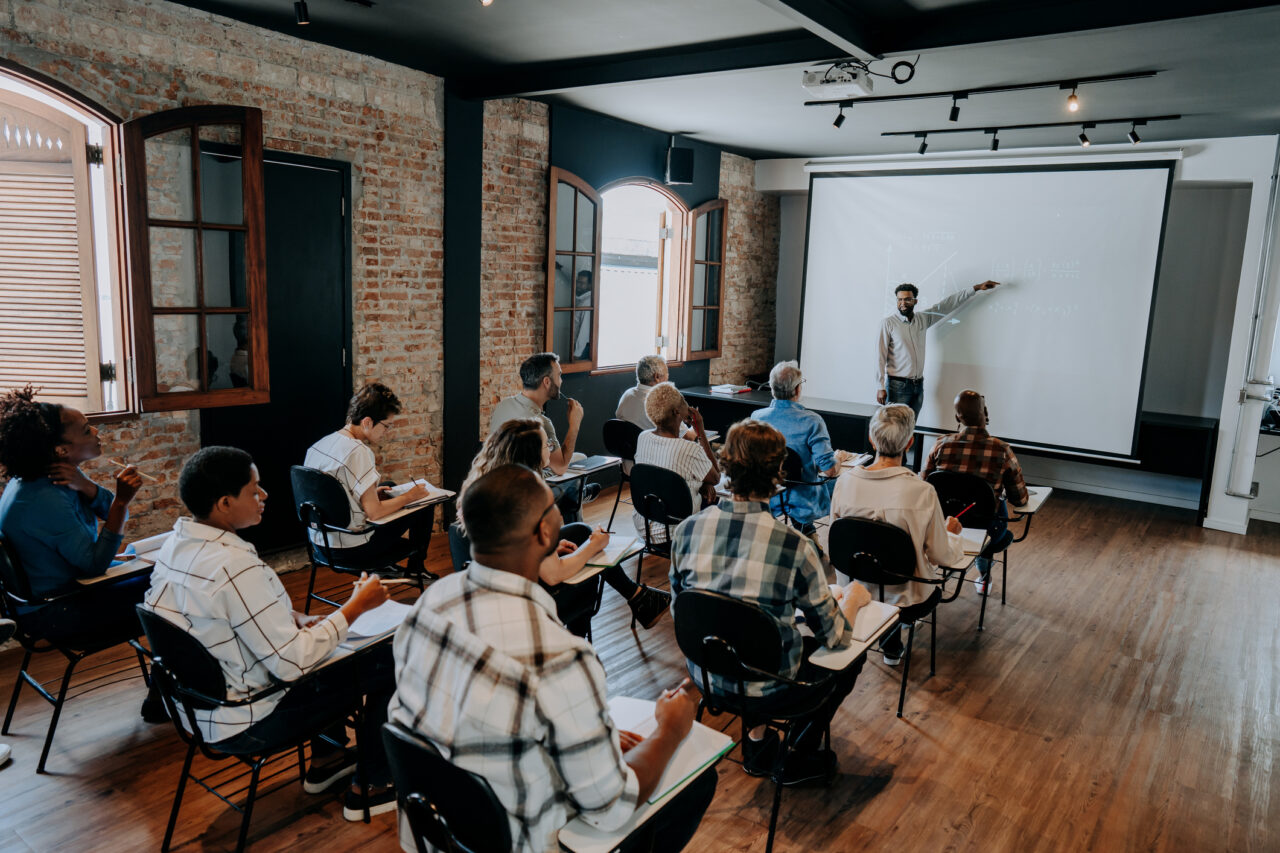In cities across the country, people with lived experience in the justice system are laying the groundwork to intervene in and prevent violence. Through Community Violence Intervention (CVI) initiatives, credible messengers — individuals directly impacted by crime and violence who now serve as mentors — can be a force for advancing community safety. As members of their community who have a rapport with residents, these messengers are well-suited to effectively reach those at the highest risk of being involved in and/or impacted by violence. However, it is common for those in this field to encounter burnout, trauma, and fatigue due to their proximity to local violence. To combat these symptoms while also creating a pipeline for career advancement, a variety of organizations and higher education institutions are developing and implementing coursework to move this important field forward and, in turn, support city efforts to build safe communities.
CVI Leadership Academy – University of Chicago Crime Lab
Built to support leaders within the CVI ecosystem, the University of Chicago Crime Lab developed the Community Violence Intervention Leadership Academy (CVILA). As a pioneering management and training program for CVI leaders, the academy provides knowledge, skills, and training that ensures CVI leaders have the tools needed to not only execute their role duties but also to excel. Some of the training includes strategies to manage and maintain staff, utilize data to inform intervention work, effectively implement violence prevention/reduction initiatives, and conduct community engagement. The integration of research derived theory and knowledge based on lived experience bridges historical resource gaps in the intervention space that is essential to public safety.

“In the field of gun violence prevention, collaborations between academic institutions and community-based organizations hold promise not only in tackling the immediate challenges of gun violence in our communities but also in ensuring the long-term sustainability and effectiveness of these interventions. Most often viewed as research and evaluation partnerships, these collaborations can enhance our collective understanding of which programs are effective, for whom, and why — key insights that can drive large-scale progress. However, there are many other ways that academic institutions can and should partner with community violence intervention organizations. This includes offering technical assistance and data analysis support to organizations as well as providing CVI leaders with rigorous training and education akin to that received by executives in other sectors.”— Kim Smith, Director of Programs, University of Chicago Crime Lab.
This year, CVILA successfully trained and celebrated the graduation of its inaugural cohort of 31 leaders representing 22 localities in their immersive five-month long academy. The launch of CVILA marks a significant step toward growing the work of CVI and strengthening the leadership skills of individuals committed to using their lived experiences to intervene in violence. The benefits of the academy were elevated by graduates. When asked what the experience was like, participants shared overwhelmingly positive sentiments.
“CVILA represents more than a program to me; it’s a vision for the future of community safety. It offers a unique platform for emerging leaders to come together, share insights, and foster dialogue on violence intervention,” shared DeAngelo Harris-Rosa, Deputy Director for the Philadelphia Office of Violence Prevention. “Throughout the intensive six-month training, I was privileged to collaborate with a diverse group of talented individuals — educators, researchers, messengers, and organizers. This formed a supportive network that not only encouraged and inspired us but also empowered us to leverage our unique experiences and expertise to significantly impact those affected by violence. Together, we are driving meaningful change in our communities.”
Gun Violence Reduction | Peace For DC | Washington, D.C.

In our nation’s capital, Peace For DC serves as a training program for a variety of violence interruption programs across the city. Launched in 2021, the program engages community-based organizations, the philanthropic sector, experts, and policymakers in a collective effort to reduce gun violence in the city, with a specific focus on neighborhoods that have higher rates of shootings. This academy not only sharpens the skills of its participants but it also creates a safe space for trauma recovery and healing for those on the frontlines across the city. Key components of Peace for DC Include training, healing trauma, transforming lives, systems change, issue awareness, and advocacy.
“The Peace Academy provides advanced training for all violence interrupters in Washington DC. The importance of our academy is best described by our graduates, who have stated that after completion, they feel more empowered in the career of peace-making. Additionally, they state that they appreciate the therapeutic services provided that help them to heal from the day-to-day trauma they endure. While the Peace Academy’s curriculum is designed to enhance, broaden, and professionalize this impactful work, we also have a unique intention to heal the healers.” — Marcus Ellis, Executive Director, Peace For DC.
The Roca Impact Institute
Direct and indirect trauma are commonly experienced by intervention professionals. Roca is a well-recognized organization that was founded in 1988 to support high-risk populations impacted by poverty and violence. It has since evolved to support underlying trauma connected to violence. Roca deploys resources for at-risk individuals through support and skills such as research-backed cognitive behavioral theory (Rewire CBT) to teach emotional regulation and behavior change. These tools that were originally taught to young adults at risk of violence are now being taught to professionals working as violence intervention specialists who, in turn, can utilize the same tools to heal themselves and teach others. The institute is an intensive coaching arm of the organization that equips institutions and individuals engaged in community violence intervention programming and those working in juvenile justice systems as well as police departments with impactful resources. In describing its importance, Roca team members share how the institute can prepare those interacting with young people can influence their decision-making.

“We created a non-clinical cognitive behavioral therapy (CBT) curriculum that was designed to be taught by frontline workers—those that have the most contact with young people on a daily basis. It is designed to be mobile, and it is delivered to young people on the streets during real-life situations. If we build young people’s skills, while they’re in those situations, if they can recall some of those skills, it gives them a chance to slow down and make a different decision.” — James “JT” Timpson, Managing Director, Community Violence Initiatives, Roca Impact Institute.

The Impact Institute has trained and coached individuals more than 2,500 individuals in 20-plus cities, including San Francisco, Baltimore, and Washington D.C.
To build a comprehensive public safety ecosystem in cities, opportunities for those with lived experience to create, support, and advance components of that ecosystem are imperative. Efforts that provide knowledge, skills, and training to those leading the work bolster cities’ commitment to public safety. By collaborating with higher education, philanthropy and non-profit organizations, cities can support and uplift those with lived experience to lead efforts in communities that disrupt and prevent violence.
You’re Invited
Hear directly from local elected officials impacted by the justice system during the webinar, Bringing Lived Experience to City Hall: Justice Impacted Local Elected Officials, happening from 1 PM to 2:15 PM (ET) Thursday, April 25.


